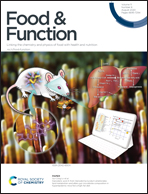Sturgeon hydrolysates alleviate DSS-induced colon colitis in mice by modulating NF-κB, MAPK, and microbiota composition
Abstract
Sturgeon muscle byproduct collected after caviar production is usually not fully utilized, and sometimes may be discarded, thus causing a lot of waste. Yet dietary protein hydrolysates, which may be derived from sturgeon muscle, have been reported to have versatile beneficial biological activities. Studying the biological activities of sturgeon muscle-derived hydrolysates holds much promise for adding value to sturgeon. The current study aimed to study the therapeutic anti-inflammatory effects of sturgeon muscle-derived hydrolysates and the underlying mechanisms. The administration of sturgeon hydrolysates (SH) significantly decreased the severity of DSS-induced damage, evidenced by increased body weight, colon length, and decreased disease activity index (DAI) and histological scores. SH also inhibited myeloperoxidase (MPO) activity and reduced the serum levels of IL-6, IL-1β, and TNF-α. Western blotting results revealed that SH suppressed DSS-induced activation of the NF-κB and MAPK pathways in the colon. Furthermore, SH partially restored the alteration of the gut microbiota in colitic mice. SH increased the Bacteroidetes/Firmicutes ratio and the relative abundance of Ruminococcaceae, Porphyromonadaceae, and Bacteroidetes S24-7, while decreased the abundance of potentially harmful bacteria Erysipelotrichaceae and Enterococcaceae. These results suggest that SH inhibited DSS-induced colitis by regulating the NF-κB and MAPK pathways and modulating microbiota composition.



 Please wait while we load your content...
Please wait while we load your content...